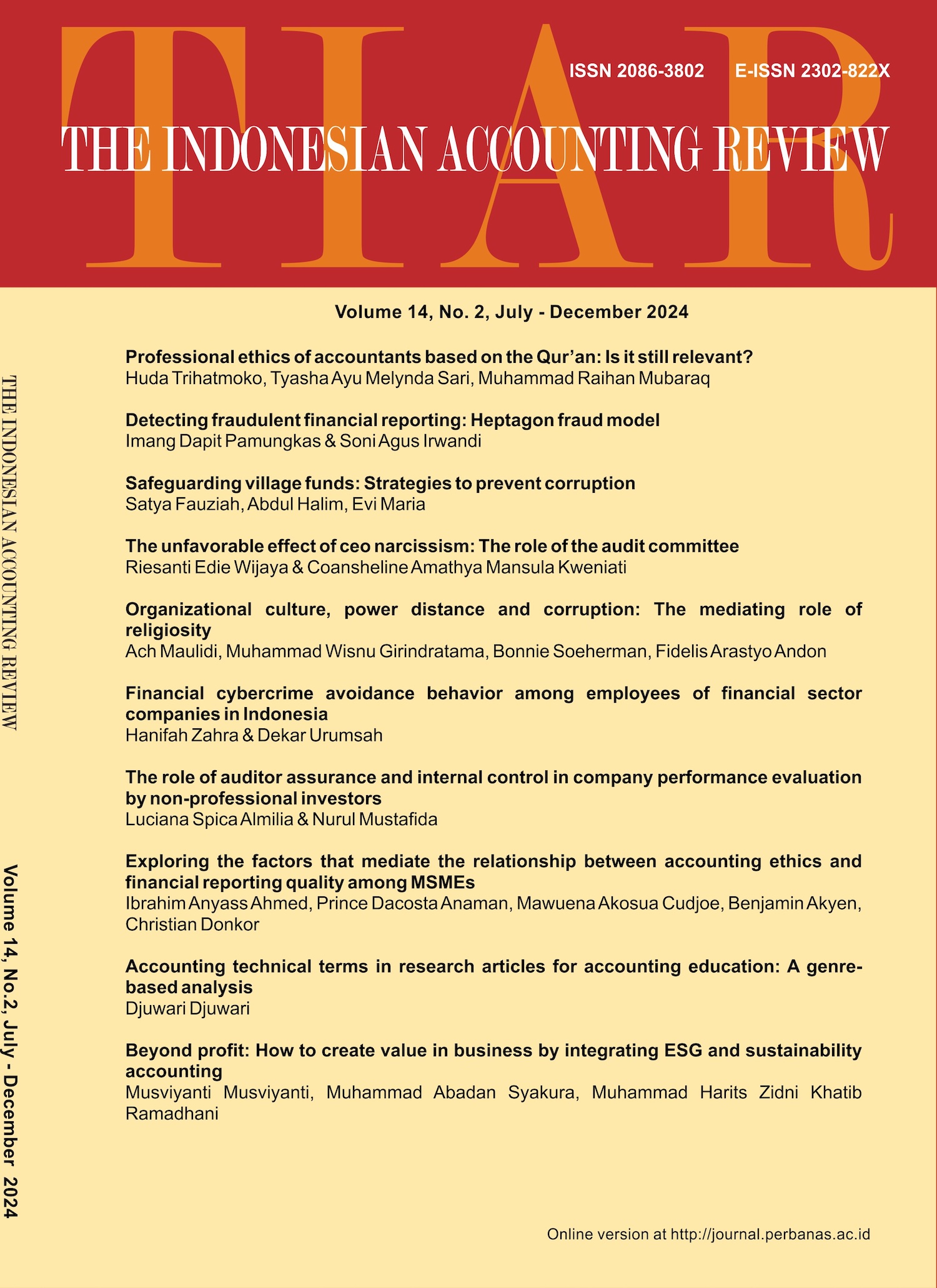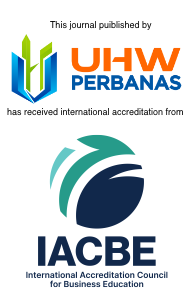Detecting fraudulent financial reporting: Heptagon fraud model
DOI:
https://doi.org/10.14414/tiar.v14i2.4523Keywords:
Fraudulent financial reporting, Heptagon fraud, Corporate governance mechanismAbstract
This study aims to examine the role of corporate governance mechanisms in detecting fraudulent financial reporting (FFR) based on the fraud heptagon model. Quantitative method is used to analyze secondary data obtained from annual reports of State-Owned Enterprises (SOEs) listed on the Indonesia Stock Exchange for the period of 2019-2022. Sampling is carried out using purposive sampling method. This study uses 80 samples which are processed using WarpPLS 8.0 with the logistic regression analysis method. The results show that pressure and rationalization have an effect on fraudulent financial reporting. In contrast, other elements such as opportunity, capabilities, arrogance, ignorance, and greed do not have a significant effect on fraudulent financial reporting. Corporate governance mechanisms only moderate the effect of arrogance and ignorance on fraudulent financial reporting. It is expected that regulatory authorities in State-Owned Enterprises understand the reliability of the fraud heptagon model in detecting financial reporting fraud and provide guidance on fraud detection priorities. The novelty of this study is that it places corporate governance mechanisms as a moderating variable in the effect of fraud heptagon model on financial reporting fraud in State-Owned Enterprises in Indonesia.
References
Abdallah, A., Maarof, M. A., & Zainal, A. (2016). Fraud detection system: A survey. Journal of Network and Computer Applications, 68, 90–113. https://doi.org/10.1016/j.jnca.2016.04.007.
ACFE. (2022). Occupational Fraud 2022: A Report to the Nations. Association of Certified Fraud Examiners, 1–96.
ACFE Global. (2020). Report to the Nations on Occupational Fraud and Abuse: 2020 Global Fraud Study. Association of Certified Fraud Examiners, Inc., 1–88.
Achmad, T., Ghozali, I., Helmina, M. R. A., Hapsari, D. I., & Pamungkas, I. D. (2022). Detecting Fraudulent Financial Reporting Using the Fraud Hexagon Model: Evidence from the Banking Sector in Indonesia. Economies, 11(1), 5-12.
Achmad, T., Ghozali, I., & Pamungkas, I. D. (2022a). Hexagon fraud: Detection of fraudulent financial reporting in state-owned enterprises Indonesia. Economies, 10(1), 13.
Achmad, T., Ghozali, I., & Pamungkas, I. D. (2022b). Hexagon Fraud: Detection of Fraudulent Financial Reporting in State-Owned Enterprises Indonesia. Economies, 10(1), 1–16. https://doi.org/10.3390/economies10010013.
Akbar, D. A., Africano, F., & Isrodinata, R. (2021). Can Fraud Diamond Affect Fraud Financial Statements in Sharia Commercial Banks? Jurnal Reviu Akuntansi Dan Keuangan, 11(1), 40–57.
ALShanti, A. M., Al-Azab, H. A. H., Humeedat, M. M., & AlQudah, M. Z. (2024). Exploring the evolution of creative accounting and external auditors: Bibliometric analysis. Cogent Business & Management, 11(1), 2300500.
Alzoubi, E. S. S., Selamat, M. H., Horton, J., Serafeim, G., Serafeim, I., Kapic, J., Basic, M., Akenbor, C. O., Onuoha, T. E., Prawitt, D. F., Sharp, N. Y., Wood, D. a., Ames, D., Gaeremynck, A., Van Der Meulen, S., Willekens, M., Balakrishnan, K., Core, J. E., Verdi, R. S., … Unicef. (2013). Corporate Social Responsibility Policies In Malaysia. Contemporary Accounting Research.
Andalia, A., Amiruddin, A., & Pontoh, G. T. (2021). Analysis of Factors Affecting Fraudulent Financial Reporting with Independent Commissioners as Moderation Variable. GATR Accounting and Finance Review, 5(4), 01–12. https://doi.org/10.35609/afr.2021.5.4(1).
Andayani, W., Subekti, I., Dara, R. R., & Kasim, E. S. (2021). Corporate governance and managerial expertise influence on financial distress: the mediating role of financial performance. International Journal of Business and Emerging Markets, 13(4), 383–402.
Arisandi, D., & Verawaty. (2017). Fraud Pentagon dalam Mendeteksi Kecurangan Laporan Keuangan pad Perusahaan Keuangan dan Perbankan di Indonesia. Seminar Nasional Global Competitive Advantage, 3, 312–323.
Ariyadi, F. (2020). Penerapan business judgement rules dalam badan usaha milik negara studi kasus PT asuransi jiwasraya. Indonesian Journal of Law and Policy Studies, 1(1), 65–75.
Aulia Haqq, A. P. N., & Budiwitjaksono, G. S. (2020). Analisa teori fraud pentagon sebagai pendeteksi kecurangan pada laporan keuangan. Journal of Economics, Business, & Accountancy Ventura, 22(3), 319–332. https://doi.org/10.14414/jebav.v22i3.1788.
Awalluddin, M. A., Nooriani, T. I. T., & Maznorbalia, A. S. (2022). The relationship between perceived pressure, perceived opportunity, perceived rationalization, and fraud tendency among employees: A study from the people’s trust in Malaysia. Studies in Business and Economics, 17(2), 23–43.
Bawekes, H. F., Simanjuntak, A. M. A., & Daat, S. C. (2018). Pengujian teori fraud pentagon terhadap fraudulent financial reporting. Jurnal Akuntansi Dan Keuangan Daerah, 13(1), 114–134.
Beneish, M. D. (1999). The detection of earnings manipulation. Financial Analysts Journal, 55(5), 24–36.
Button, M., Hock, B., Shepherd, D., & Gilmour, P. M. (2023). What really works in preventing fraud against organisations and do decision-makers really need to know? Security Journal, 1–19.
Cheliatsidou, A., Sariannidis, N., Garefalakis, A., Azibi, J., & Kagias, P. (2023). The international fraud triangle. Journal of Money Laundering Control, 26(1), 106–132.
Chen, G., Firth, M., Gao, D. N., & Rui, O. M. (2006). Ownership structure, corporate governance, and fraud: Evidence from China. Journal of Corporate Finance, 12(3), 424–448.
Chen, X., Wang, Y., & Zhang, Y. (2023). Detecting Financial Statement Fraud Using Machine-Learning Methods. In FinTech Research and Applications: Challenges and Opportunities (pp. 235–263). World Scientific.
Christian, N., Kho, J., Kho, K., Cahya, C., & Agustina, M. (2021). Is fraud pentagon effective in detecting fraudulent financial statement in cambodia. Jurnal Ilmiah Mea (Manajemen, Ekonomi, & Akuntansi), 5(2), 1163–1182.
Cressey. (1953). Other people’s money; a study of the social psychology of embezzlement. pp. 1-300.
Damayanti, F., & Susanto, T. (2015). Pengaruh komite audit, kualitas audit, kepemilikan institusional, risiko perusahaan dan return on assets terhadap tax avoidance. Jurnal Bisnis dan Manajemen, 5(2), 187–206.
Dewi, K., & Anisykurlillah, I. (2021). Analysis of the Effect of Fraud Pentagon Factors on Fraudulent Financial Statement with Audit Committee as Moderating Variable. Accounting Analysis Journal, 10(1), 39–46. https://doi.org/10.15294/aaj.v10i1.44520.
Dewi, N. P. G. P., & Yudantara, I. G. A. P. (2020). Pendeteksian Kecurangan Pelaporan Keuangan Dengan Menggunakan Pentagon Fraud Pada BUMN Yang Terdaftar Di Bursa Efek Indonesia. Vokasi : Jurnal Riset Akuntansi, 9(2), 100-110. https://doi.org/10.23887/vjra.v9i2.27010.
Donald, M., & Parajow, F. S. (2023). Analyzing the Implementation of Good Corporate Governance (Gcg) and Internal Control at State Owned Enterprises (Bumn). EUROPEAN JOURNAL OF BUSINESS STARTUPS AND OPEN SOCIETY, 3(4), 42–53.
Evana, E., Metalia, M., Mirfazli, E., Georgieva, D. V., & Sastrodiharjo, I. (2019). Business Ethics in Providing Financial Statements: The Testing of Fraud Pentagon Theory on the Manufacturing Sector in Indonesia. Business Ethics and Leadership, 3(3), 68–77. https://doi.org/10.21272/bel.3(3).68-77.2019.
Faradiza, S. A. (2019). Fraud Pentagon Dan Kecurangan Laporan Keuangan. EkBis: Jurnal Ekonomi Dan Bisnis, 2(1), 1-11. https://doi.org/10.14421/ekbis.2018.2.1.1060.
Ghaisani, H. M., Dwi, A., & Bawono, B. (2022). Analysis of Financial Statement Fraud : The Vousinas Fraud Hexagon Model Approach and the Audit Committe as Moderating Variable. The International Journal of Business Management and Technology, 6(6), 115–125.
Ghozali, I. (2016). Aplikasi Analisis Multivariete dengan Program IBM SPSS 23, Edisi Delapan. Penerbit Universitas Diponogoro. Semarang.
Handoko, B. L. (2021). Fraud Hexagon Dalam Mendeteksi Financial Statement Fraud Perusahaan Perbankan Di Indonesia. Jurnal Kajian Akuntansi, 5(2), 2579–9975.
Handoko, B. L., & Angelyca, A. N. (2023). Examining the Psychological Aspect: Fraudulent Financial Reporting in Property and Real Estate Companies Listed on the Indonesia Stock Exchange During the Covid-19 Pandemic using the Fraud Heptagon Approach. Journal for ReAttach Therapy and Developmental Diversities, 6(10s (2)), 650–661.
Handoko, B. L., Putri, R. N. A., & Wijaya, S. (2022). Analysis of Fraudulent Financial Reporting based on Fraud Heptagon Model in Transportation and Logistic Industry listed on IDX during Covid-19 Pandemic. ACM International Conference Proceeding Series, 56–63. https://doi.org/10.1145/3578997.3579003
Hardika, A. L., Manurung, D. T. H., & Mulyati, Y. (2018). Corporate Governance Mechanism, Company Size Financial Performance and Sustainability Reporting. International Journal of Engineering & Technology, 7(4.34), 201–203.
Hermansjah, R., Sugiarto, S., Ugut, G., & Hulu, E. (2021). The effect of government ownership on Indonesia’s state-owned enterprises’(SOE) firm performance. Accounting, 7(6), 1347–1352.
Hidayah, E., & Saptarini, G. D. (2019). Pentagon Fraud Analysis in Detecting Potential Financial Statement Fraud of Banking Companies in Indonesia. International Conference on Accounting, Business, & Economics, 3(2010), 89–102.
Ibrani, E. Y., Faisal, F., & Handayani, Y. D. (2019). Determinant of non-GAAP earnings management practices and its impact on firm value. Cogent Business and Management, 6(1), 1–17. https://doi.org/10.1080/23311975.2019.1666642.
Imtikhani, L., & Sukirman. (2021). Determinan Fraudulent Financial Statement Melalui Perspektif Fraud Hexagon Theory Pada Perusahaan Pertambangan. Jurnal Akuntansi Bisnis, 19(1), 2541–5204.
Indonesia, C. N. N. (2020). Kronologi kasus jiwasraya, gagal bayar hingga dugaan korupsi. CNN Indonesia.(Retrieved from: Https://Www. Cnnindonesia. Com/Ekonomi/20200108111414-78-463406/Kronologikasus-Jiwasraya-Gagal-Bayar-Hingga-Dugaan-Korupsi.
Kalovya, O. Z. (2023). Determinants of occupational fraud losses: offenders, victims and insights from fraud theory. Journal of Financial Crime, 30(2), 361–376.
Khamainy, A. H., Amalia, M. M., Cakranegara, P. A., & Indrawati, A. (2022). Financial statement fraud: The predictive relevance of fraud Hexagon theory. JASF, 5(1), 110–133.
Lastanti, H. S., Murwaningsari, E., & Umar, H. (2022). The Effect of Hexagon Fraud on Fraud Financial Statements with Governance and Culture as Moderating Variables. Media Riset Akuntansi, Auditing & Informasi, 22(1), 143–156. https://doi.org/10.25105/mraai.v22i1.13533.
Lefina Boboy, E., Tiwu, M. I., Dethan, M., Joyce, S., & Rafael, M. (2022). Detection of Financial Statement Fraud Based on Fraud Diamond on Transportation Companies during Covid-19 Pandemic with the Audit Committee as Moderating Variable. International Journal of Innovative Science and Research Technology, 7(4), 1057–1064.
Li, C., Li, N., & Zhang, F. (2023). Using economic links between firms to detect accounting fraud. The Accounting Review, 98(1), 399–421.
Lionardi, M., & Suhartono, S. (2022). Pendeteksian Kemungkinan Terjadinya Fraudulent Financial Statement menggunakan Fraud Hexagon. Jurnal Khatulistiwa Informatika, 9(1), 29–38.
Mahboob, F. (2022). Business ethics-hindrance or necessity for corporate profitability: an empirical corporate governance study of US listed firms. International Journal of Business and Economic Affairs, 7(3), 11–28.
Malca, O., Bolaños, J. P., Acedo, F. J., Rubio Donet, J. L., & Peña-Vinces, J. (2020). Relational flexibility norms and relationship-building capabilities as a mediating mechanism in export performance: insights from exporting SMEs in an emerging economy, Peru. International Journal of Emerging Markets. https://doi.org/10.1108/IJOEM-09-2019-0735.
Maulidi, A., & Ansell, J. (2021). The conception of organisational fraud: The need for rejuvenation of fraud theory. Journal of Financial Crime, 28(3), 784–796.
Mohamed, N., Zakaria, N. B., Nazip, N. S. B. M., & Muhamad, N. F. (2021). The influencing factors of employee fraud in Malaysian financial institution: The application of the fraud pentagon theory. Academy of Strategic Management Journal, 20, 1–12.
Mohamed Yusof, K. (2016). Fraudulent financial reporting: An application of fraud models to Malaysian public listed companies. University of Hull.
Muawanah, W., & Sari, R. P. (2023). Detection of Financial Distress Mediated by Fraudulent Financial Statements with the F-Score and Z-Score Approach in the Pandemic Era Listed on the Indonesia Stock Exchange. Formosa Journal of Applied Sciences, 2(7), 1743–1760.
Muhsin, M., Kardoyo, M., Arief, S., Nurkhin, A., & Pramusinto, H. (2018). An Analysis of Student’s Academic Fraud Behavior. 164(Icli 2017), 34–38. https://doi.org/10.2991/icli-17.2018.7.
Mukaromah, I., & Budiwitjaksono, G. S. (2021). Fraud Hexagon Theory dalam Mendeteksi Kecurangan Laporan Keuangan pada Perbankan yang Terdaftar di Bursa Efek Indonesia Tahun 2015-2019. Jurnal Ilmiah Komputerisasi Akuntansi, 14(1), 61–72.
Mulya, A., Rahmatika, D. N., & Kartikasari, M. D. (2019). Pengaruh Fraud Pentagon (Pressure, Opportunity, Rationalization, Competence dan Arrogance) Terhadap Pendeteksian Fraudulent Financial Statement Pada Perusahaan Property, Real Estate and Building Construction yang Terdaftar di Bursa Efek Indonesia. Permana: Jurnal Perpajakan, Manajemen, dan Akuntansi, 11(1), 11–25.
Nawawi, A., & Salin, A. S. A. P. (2018). Internal control and employees’ occupational fraud on expenditure claims. Journal of Financial Crime.
Nikmah, N., & Arjoen, M. R. (2023). Financial statement fraud, audit committee and audit quality: Insight into fraud diamond theory. International Journal of Social Service and Research, 3(3), 606–620.
Nikmah, N., & Arjoen, M. R. (2023). Financial Statement Fraud, Audit Committee and Audit Quality: Insight into Fraud Diamond Theory. International Journal of Social Service and Research, 3(3), 605–620.
Nugroho, D., & Diyanty, V. (2022). Hexagon Fraud in Fraudulent Financial Statements: the Moderating Role of Audit Committee. Jurnal Akuntansi Dan Keuangan Indonesia, 19(1), 46–67. https://doi.org/10.21002/jaki.2022.03.
Nurbaiti, Z., & Hanafi, R. (2017). Analisis pengaruh fraud diamond dalam mendeteksi tingkat accounting irregularities. Jurnal Akuntansi Indonesia, 6(2), 167–184.
Nurhakim, A. L., & Harto, P. (2023). Kecurangan, BUMN Fraud Pentagon: Deteksi Kecurangan Laporan Keuangan Pada Badan Usaha Milik Negara. E-Jurnal Akuntansi, 33(2), 311. https://doi.org/10.24843/eja.2023.v33.i02.p03.
Oktavia, S., Bahari, A., & Kartika, R. (2022). Pengaruh Elemen Fraud Hexagon Theory Terhadap Fraud Laporan Keuangan. Jurnal Akuntansi Dan Ekonomika, 12(2), 275–284.
Omukaga, K. O. (2021). Is the fraud diamond perspective valid in Kenya? Journal of Financial Crime, 28(3), 810–840.
Owusu, G. M. Y., Koomson, T. A. A., Alipoe, S. A., & Kani, Y. A. (2022). Examining the predictors of fraud in state-owned enterprises: an application of the fraud triangle theory. Journal of Money Laundering Control, 25(2), 427–444.
Ozcelik, H. (2020). An analysis of fraudulent financial reporting using the fraud diamond theory perspective: an empirical study on the manufacturing sector companies listed on the Borsa Istanbul. Contemporary Issues in Audit Management and Forensic Accounting 102, 131–153.
Purnaningsih, N. K. C., Suaryana, I. G. N. A., Sudana, I. P., & Wirajaya, I. G. A. (2022). Fraudulent Financial Reporting Analysis on Non-Financial Companies Listed on IDX in Hexagon Fraud Perspective. Budapest International Research and Critics Institute (BIRCI-Journal), 5(2), 11331–11343.
Putri, K. T., Dachyar, M., & Pratama, N. R. (2022). The Implementation of Anti-Bribery Management System Designed to Mitigate the Bribery Risk in State-Owned Enterprises: A Case Study of the Indonesia Agribusiness Industry. IEOM Society International, 2020, 3026–3034.
Putri, P. A. A., & Irwandi, S. A. (2017). The determinants of accounting fraud tendency. The Indonesian Accounting Review, 6(1), 99-109. https://doi.org/10.14414/tiar.v6i1.857.
Rehman, A., & Hashim, F. (2020). Impact of fraud risk assessment on good corporate governance: Case of public listed companies in Oman. Business Systems Research: International Journal of the Society for Advancing Innovation and Research in Economy, 11(1), 16–30.
Robison, H. D., & Santore, R. (2011). Managerial incentives, fraud, and monitoring. Financial Review, 46(2), 281–311.
Rukmana, H. S. (2018). Pentagon Fraud Affect on Financial Statement Fraud and Firm Value. South East Asia Journal of Contemporary Business, 16(5), 118–122.
Saeed, S., Rasid, S. Z. A., & Basiruddin, R. (2015). The mediating role of intellectual capital in corporate governance and the corporate performance relationship. Mediterranean Journal of Social Sciences, 6(5), 209–219. https://doi.org/10.5901/mjss.2015.v6n5p209.
Sagala, S. G., & Siagian, V. (2021). Pengaruh Fraud Hexagon Model Terhadap Fraudulent Laporan Keuangan pada Perusahaan Sub Sektor Makanan dan Minuman yang Terdaftar di BEI Tahun 2016-2019. Jurnal Akuntansi, 13(2), 245–259.
Sahla, W. A., & Ardianto, A. (2023). Ethical values and auditors fraud tendency perception: testing of fraud pentagon theory. Journal of Financial Crime, 30(4), 966–982.
Sari, M. P., Kiswanto, Rahmadani, L. V., Khairunnisa, H., & Pamungkas, I. D. (2020). Detection of fraudulent financial reporting and corporate governance mechanisms using fraud diamond theory of the property and construction sectors in Indonesia. Humanities and Social Sciences Reviews, 8(3), 1065–1072. https://doi.org/10.18510/HSSR.2020.83109.
Sari, M. P., Mahardika, E., Suryandari, D., & Raharja, S. (2022). The audit committee as moderating the effect of hexagon’s fraud on fraudulent financial statements in mining companies listed on the Indonesia stock exchange. Cogent Business and Management, 9(1). https://doi.org/10.1080/23311975.2022.2150118.
Sarikhani, M., & Ebrahimi, F. (2022). Whistleblowing by accountants: an integration of the fraud pentagon and the extended theory of planned behavior. Meditari Accountancy Research, 30(6), 1740–1763.
Sasongko, N., & Wijayantika, S. F. (2019). Faktor Resiko Fraud Terhadap Pelaksanaan Fraudulent Financial Reporting (Berdasarkan Pendekatan Crown’S Fraud Pentagon Theory). Riset Akuntansi Dan Keuangan Indonesia, 4(1), 67–76. https://doi.org/10.23917/reaksi.v4i1.7809.
Sawaka K., I. G. N. H. (2020). Fraud pentagon theory in detecting financial perception of financial reporting with good corporate governance as moderator variable. International Research Journal of Management, IT and Social Sciences, 84–94. https://doi.org/10.21744/irjmis.v7n1.824.
Schnatterly, K., Gangloff, K. A., & Tuschke, A. (2018). CEO wrongdoing: A review of pressure, opportunity, and rationalization. Journal of Management, 44(6), 2405–2432.
Schrand, C. M., & Zechman, S. L. C. (2012). Executive overconfidence and the slippery slope to financial misreporting. Journal of Accounting and Economics, 53(1–2), 311–329.
Sithic, H. L., & Balasubramanian, T. (2013). Survey of insurance fraud detection using data mining techniques. ArXiv Preprint ArXiv:1309.0806.
Situngkir, N. C., & Triyanto, D. N. (2020). Detecting Fraudulent Financial Reporting Using Fraud Score Model and Fraud Pentagon Theory : Empirical Study of Companies Listed in the LQ 45 Index. The Indonesian Journal of Accounting Research, 23(03), 373–410. https://doi.org/10.33312/ijar.486.
Skousen, C. J., Smith, K. R., & Wright, C. J. (2009). Detecting and predicting financial statement fraud: The effectiveness of the fraud triangle and SAS No. 99. In Corporate governance and firm performance (pp. 53–81). Emerald Group Publishing Limited.
Sukmadilaga, C., Winarningsih, S., Handayani, T., Herianti, E., & Ghani, E. K. (2022). Fraudulent Financial Reporting in Ministerial and Governmental Institutions in Indonesia: An Analysis Using Hexagon Theory. Economies, 10(4), 86-95.
Suprapto, F. M., & Agustia, D. (2023). The Analysis of Fraudulent Financial Statements Prevention Using Hexagon’s Fraud and Government Internal Auditor as Moderating Variable in Local Government in Indonesia. Forum for Development Studies, 50(3), 513–537.
Suprianto, E., Rahmawati, R., Setiawan, D., & Aryani, Y. A. (2019). Controlling generation of family firms and earnings management in Indonesia: The role of accounting experts of audit committees. Journal of International Studies, 12(3), 265–276. https://doi.org/10.14254/2071-8330.2019/12-3/21.
Teguh, K. M., & Kristanto, A. B. (2020). Company characteristics and the tendency of fraudulent financial reporting. Jurnal Akuntansi Bisnis, 13(2), 1-10.
Tessa, C., & Harto, P. (2016). Fraudulent Financial Reporting : Pengujian Teori Fraud Pentagon Pada Sektor Keuangan Perbankan di Indonesia. Simposium Nasional Akuntansi XIX Lampung, 19, 1–21.
Triyanto, D. N. (2019). Detection of Financial Reporting Fraud: The Case of Socially Responsible Firms. Journal of Economics, 22(3), 399–410. https://doi.org/10.14414/jebav.v22i3.1792.
Triyanto, D. N. (2020). Detection of Financial Reporting Fraud: The Case of Socially Responsible Firms. Journal of Economics, Business, & Accountancy Ventura, 22(3), 399–410.
Uciati, N., & Mukhibad, H. (2019). Fraudulent Financial Statements at Sharia Banks. Accounting Analysis Journal, 8(3), 198–206.
Utami, E. R., & Pusparini, N. O. (2019). The Analysis Of Fraud Pentagon Theory And Financial Distress For Detecting Fraudulent Financial Reporting In Banking Sector In Indonesia (Empirical Study Of Listed Banking Companies On Indonesia Stock Exchange In 2012-2017). Advances in Economics, Business and Management Research, 102(Icaf), 60–65. https://doi.org/10.2991/icaf-19.2019.10.
Varma, D. T. N., & Khan, D. A. (2016). Greed an attribute of fraudster. AIMS International Journal of Management, 10(2), 83–99.
Vousinas, G. L. (2019). Advancing theory of fraud: the S.C.O.R.E. model. Journal of Financial Crime, 26(1), 372–381. https://doi.org/10.1108/JFC-12-2017-0128.
Wahyubroto, A. M. W. (2017). Implementasi Prinsip-prinsip Good Corporate Governance Pada Perusahaan Di Kota Gresik. Agora - Online Graduate Humanities Journal, 5(3), 1-11.
Widarti, W. (2015). Pengaruh Fraud Triangle Terhadap Deteksi Kecurangan Laporan Keuangan Pada Perusahaan Manufaktur Yang Terdaftar Di Bursa Efekindonesia (Bei). Jurnal Manajemen dan Bisnis Sriwijaya, 13(2), 229–244.
Wijayanti, D. M., Senjani, Y. P., & Farah, W. (2024). The role of Machiavellian personality, altruistic personality, religiosity, whistleblowing system, and accounting firm size in mitigating fraud intention. Journal of Financial Crime, 31(1), 119–134.
Yulianti, Y., Pratami, S. R., Widowati, Y. S., & Prapti, L. (2019). Influence of fraud pentagon toward fraudulent financial reporting in Indonesia an empirical study on financial sector listed in Indonesian stock exchange. International Journal of Scientific and Technology Research, 8(8), 237–242.
Yusof, M. (2016). Fraudulent financial reporting: An application of fraud models to malaysian public listed companies. University of Hull.
Zainal, S. F., Hashim, H. A., Ariff, A. M., & Salleh, Z. (2022). Research on fraud: an overview from small, medium enterprises (SMEs). Journal of Financial Crime, 29(4), 1283–1296.
Downloads
Submitted
Published
Issue
Section
License
Copyright (c) 2025 The Indonesian Accounting Review

This work is licensed under a Creative Commons Attribution-NonCommercial 4.0 International License.
















